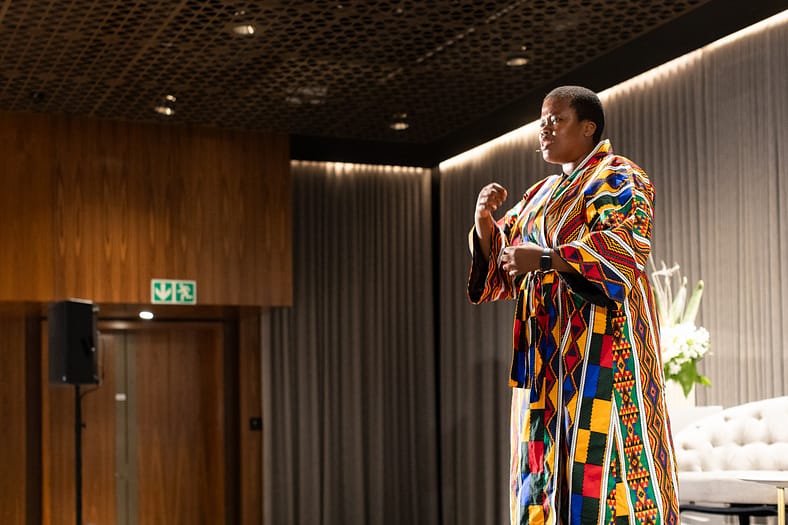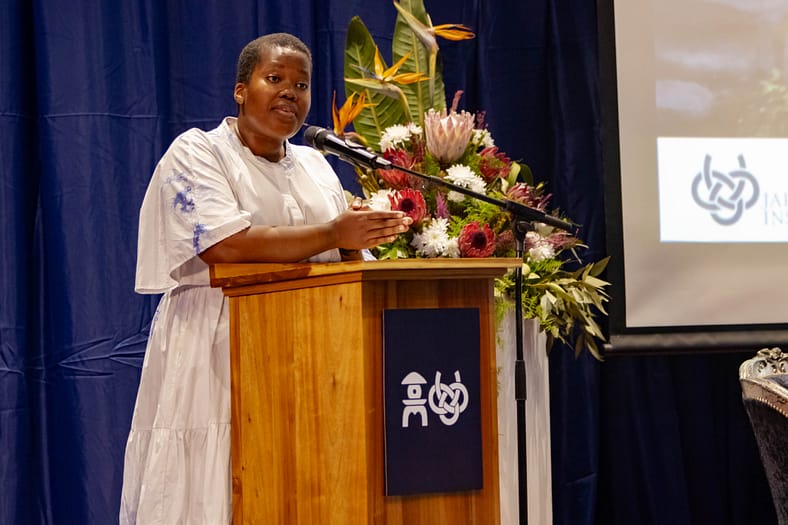
The signature programming of Japan Institute’s International Exchange Forum is its Peace Symposia, which features leaders from numerous cultural, intellectual, and diplomatic fields coming together for presentations and panel discussions on the topics of culture, art, nature, peacemaking and public spaces. Thus far, they have been held in Tokyo, London, New York, Cape Town, and Johannesburg, with more planned in the years to come.
On November 30th and December 4th, Japan Institute held its fourth and fifth Peace Symposia in Cape Town and Johannesburg, respectively. Among the many highlights of these free and public events were commissioned poetry readings by Siphokazi Jonas, work that is available to read below. Jonas was selected by Japan Institute and The Poetry Society of the U.K., a globally respected organization founded in 1909 that advances poetry through its publications, competitions, and collaborations with international organizations.

Jonas is a multi-award-winning poet, playwright, actor, and producer based in Cape Town, South Africa. Her awards include a South African Film and Television Award for Best Short Film, Most Innovative Young Artist Western Cape Cultural Affairs Award, and 100 Sunday World Unsung Heroes. Jonas has attended poetry sessions and festivals worldwide, including conferences and festivals in Portugal, Spain, Sweden, Tunisia, and Nigeria. She was the 2016 runner-up for the national Sol Plaatje European Union Award and headlined as the first Featured Poet at Poetry Africa Festival in 2021.
Joining Jonas at the Symposia were the winners of the Poetry Society’s Young Poets Network challenge, Sonelise Jonginamba, Lesedi Mogale, and Thato Tshukudu.
At the conclusion of all its Peace Symposia, Japan Institute plans to publish a book of the poetry that has been included in their programming.
Inosculation or To Be Bare at the Point of Connection by Siphokazi Jonas
I wanted to brew an intoxicating verse about how my people make peace
when the love between them chafes into a wound:
like the burning of sage to smoke a space open, or the slaughter of livestock
to restore ties between those who have departed and those who remain.
Here is where I would have come to perform an Africanness
to persuade your eye away from the calamity that exposes me:
English carried the roof of my mouth away, and I have been searching
for a gap in the fence around my mother tongue to find sanctuary.
Now, if I am to yield something ‘authentic’
(a proverb, an idiom, a vivid description of tradition)
I scavenge the dropped fruit fermenting at the base of Google’s omniscience.
Children who are defanged to accommodate a colonial tongue
are reduced to a mouthful of dentures.
When we visit mother’s village for funerals, and
to welcome new men who made it back from the mountain alive,
I hide the teeth within a recitation of clan names,
and gum my way through conversations with family
who smirk at the prosthesis of English which I fit in these gaps of isiXhosa.
I wanted to graft a circle of neighbours sipping umqobothi beer
from the same gourd into this poem,
but the ritual of gathering which our parents chose for us
is in the grape juice blood of Jesus we imbibe out of a shot glass.
Both cultures have reconciled me to a communion
that comes by way of sacrificial lambs.
I recall how my father’s brothers skinned a sheep for grandfather’s funeral,
unfastening skin with a knife from jaw to tail,
in the same backyard where my cousins and I shot marbles
before girls must abandon play for domestic rehearsals of womanhood.
When there was enough room behind the violence of the blade,
one plunged a fist against the white of the sheep’s stomach to isolate the fur.
I am an incomplete slaughter; alive and naked.
Barely able to knit a language of belonging between isiXhosa and English.
But I know from the boys we grew up with, who could contort
a piece of wire into a Ferrari on Sterkstroom’s dirt roads, that
the right pliers make a fence available to reimagination.
It is why I have begun to lower imibongo through an open roof
onto my tongue, to dispel the shame of a loss for which I am not responsible
Sometimes I call my mother and father for translation of these praise poems.
It is a new custom between the three of us; foraging through our history
for things I can turn into poems.
Just as two trees growing close enough to chafe at the point of connection
transmute the injured bark into a pattern for fresh growth.
There is a kind of peace in being a forest of trees who are willing
to turn their woundedness towards each other
Poetry Read at Japan Institute’s International Peace Symposia
Japan Institute’s peace programming, including the South Africa Peace Symposia, is made possible through Robert and Deborah Zagunis.
